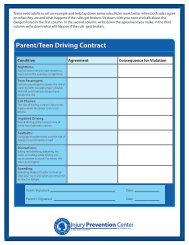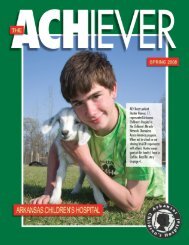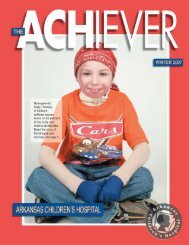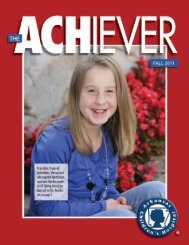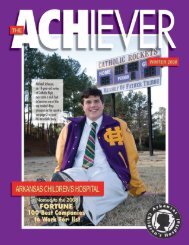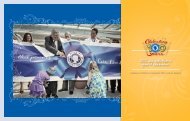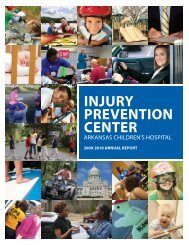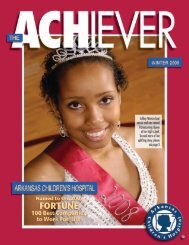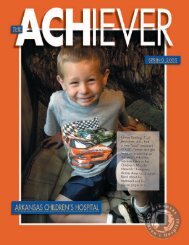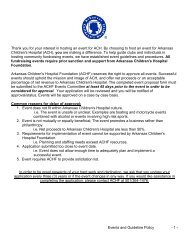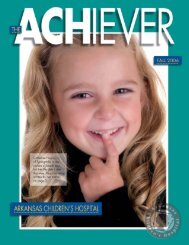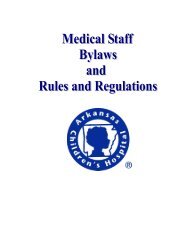facing life with a smile - Arkansas Children's Hospital
facing life with a smile - Arkansas Children's Hospital
facing life with a smile - Arkansas Children's Hospital
- No tags were found...
You also want an ePaper? Increase the reach of your titles
YUMPU automatically turns print PDFs into web optimized ePapers that Google loves.
NEWLY ELECTEDWelcome...<strong>Hospital</strong> BoardMichael Schmitz, M.D.Director, Pediatric PainManagement Program, ACH, UAMSDirector, Pediatric Cardiovascular AnesthesiaProgram, ACH, UAMSFoundation BoardJeffrey W. NolanEl DoradoPresident, Loutre Land and Timber CompanyContinued from page 5performed in the heart center operating rooms, <strong>with</strong> heartspecialists standing by in the event of an emergency.The dental department also provides emergency care forinpatients of the <strong>Hospital</strong> and for dental emergencies referredfrom the emergency room.Craniofacial orthodontic care is available for children <strong>with</strong>craniofacial disharmonies and for children <strong>with</strong> cleft lip andcleft palates. Many of the craniofacial patients require a teamof specialists to deliver quality comprehensive care that is onlyavailable in major children’s hospitals such as <strong>Arkansas</strong>Children’s <strong>Hospital</strong>. Nearly all cleft lip and cleft palate patientsrequire orthodontic intervention. <strong>Arkansas</strong> Children’s <strong>Hospital</strong>is the only facility in this region that can provide craniofacialorthodontics for many of these severely affected children.Dr. Koonce, who’s been at the hospital for over four years,tried to retire once, but only made it three months. “I justcouldn’t stand not being here,” he explains. “This is a uniqueplace, and I’ve never worked <strong>with</strong> a group like this. Everydepartment really works well together.”Koonce and his staff have many patients who have grownup coming to the hospital and to the dental clinic, and he sayshe has learned so much from the patients and their families.“There are so many special parents and grandparents who doso much, sometimes coming a long distance at great cost, tomake sure they get the best care for their children.” Parentsaren’t the only ones who receive Koonce’s respect and admiration;he can’t say enough about the Dental Clinic staff. “Ourstaff is phenomenal,” he says. “Frankly, they could make moremoney elsewhere. They are here because they love childrenand they enjoy the rewards of treating kids <strong>with</strong> special needs.“The best reward is when we see patients like Edwin whocan face the future <strong>with</strong> a <strong>smile</strong> on their face.”Continued from page 4psychosocial issues involved in placing children on insulinpump therapy for Type 1 diabetes. This initiative will belooking into family dynamics as they relate to how well achild will do <strong>with</strong> more modern, yet more intensive, managementschemes to control blood sugar levels. Manyfamilies feel a great deal of anxiety and apprehensionwhen they feel they are ultimately responsible for theirchild’s long-term health. These studies will hopefully shedlight on how health professionals can better help suchfamilies adjust to these pressures.<strong>Arkansas</strong> Children’s <strong>Hospital</strong> also has been, and willbe again, a site involved in such multi-site studies as theDiabetes Prevention Trial (DPT), which involves screeningfor pre-diabetes and intervention programs to avert diabetes.New initiatives will be targeted to try to developtherapies to prevent or curtail the onset and progressionof Type 1 diabetes.From a clinical standpoint, Fowlkes says the rise indiabetes in children is troublesome because there aremore children who need to be cared for by subspecialiststhan there are subspecialists who have the training andthe background in diabetes. He says it is difficult torecruit and retain people who can care for these children.To help meet this important and increasing need,Fowlkes received funds to assist <strong>with</strong> the recruitment ofnew staff from the Martha Ann Pugh Memorial Fund forJuvenile Diabetes. The fund was established last year bythe parents of Martha Ann Pugh and others who madegifts in her memory. The goal of the fund was to helpFowlkes build on his program so that children <strong>facing</strong> diabetesmay be better served. With the help of the Pughfund, <strong>Arkansas</strong> Children’s <strong>Hospital</strong> recently added oneendocrinologist to its staff and expects to add another inJuly.8



